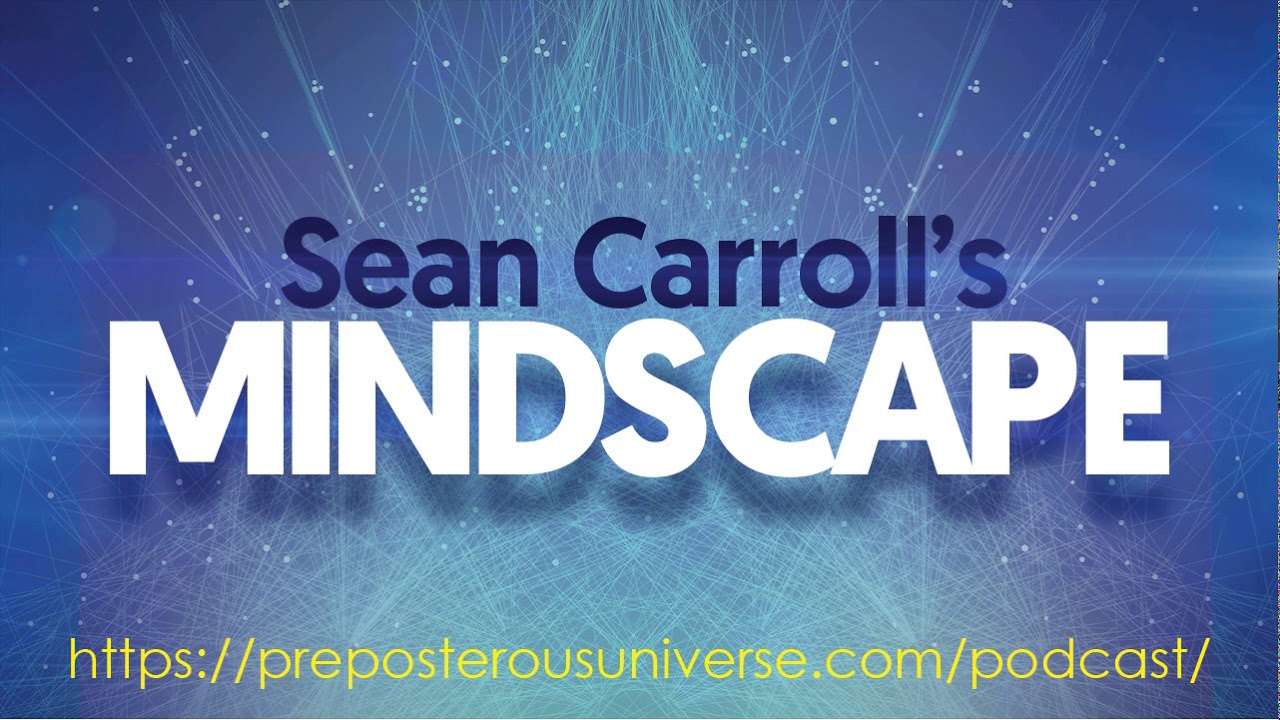Sean Carroll
Blog post with audio player, show notes, and transcript: https://www.preposterousuniverse.com/podcast/2019/11/04/71-philip-goff-on-consciousness-everywhere/
Patreon: https://www.patreon.com/seanmcarroll
The human brain contains roughly 85 billion neurons, wired together in an extraordinarily complex network of interconnected parts. It’s hardly surprising that we don’t understand the mind and how it works. But do we know enough about our experience of consciousness to suggest that consciousness cannot arise from nothing more than the physical interactions of bits of matter? Panpsychism is the idea that consciousness, or at least some mental aspect, is pervasive in the world, in atoms and rocks as well as in living creatures. Philosopher Philip Goff is one of the foremost modern advocates of this idea. We have a friendly and productive conversation, notwithstanding my own view that the laws of physics don’t need any augmenting to ultimately account for consciousness. If you’re not sympathetic toward panpsychism, this episode will at least help you understand why someone might be.
Philip Goff received his Ph.D. in philosophy from the University of Reading. He is currently Assistant Professor in the Department of Philosophy at the University of Durham. His new book, Galileo’s Error: Foundations for a New Science of Consciousness, is being published on Nov. 5.
Source



We know the world through our experiences (internal) and nothing can explain that. There no way physic can explain so far our subjective experience in first person.
dd
Let us not forget that our physical models of Nature are simplified, and are not Nature itself.
When we try to narrow down Nature through these models into precise certainty, we find before us
exactly that truth that it cannot be narrowed down as we would like to conceive. That through
'the nature of' our sequential thinking, and thus of our sequential information models born out of it,
that the nature then of 'precision', or certainty demands the knowing of the whole, of the infinite.
Of the "universe" as physicists would call it. "The wave function of the universe", as Sean has come to knows it.
All of Nature, the entity beneath the "stuff" in the end remains a single unit,
and it "… cannot be created nor destroyed …" as some old wisdoms would put it;
it cannot be divided, and it remains thus the transparent "atom" of reality.
In this very simple way, and in that way known too in the realm of physics, we know then that
any single "point" in "the universe" is exactly that, and is exactly there, in function of everything else
around it–and viceversa–, and that "everything else" is ultimately precisely "the universe" itself.
And thus, that whatever we like to call "consciousness" is precisely a constant making of the whole, truly.
This simple, trivial Truth; we see it, and we experience it, beyond the realms of artificial intellectual banality.
Even if panpsychism is true how does it explain anything relating to the hard problem? How can you possibly explain the "redness of red" to take Goff's example by aggregating atomic forms of consciousness that would be, as Goff says, radically unlike our own forms of consciousness?
This was painful to listen to. David Deutsch has a chapter on ”Bad philosophy” in BoI, which comes to mind.
Philosopher: “Mass, charge, and spin are forms of consciousness.”
Scientist: “Can you explain what the hell that means?”
Philosopher: “……….No.”
This guy was thoroughly demolished. He is just repeating what he read in books during his college years. He is not capable of understanding what is being told to him and respond to it. That's sad.
To me, reproducing the real world "magic" in a simulation would not be fully satisfactory but I feel we have to accept that as the best we can ever hope to get. The question of what's inside (whether a human or a machine): a real conscious being or a zombie – that will remain unanswered. Maybe AI could get to truly understanding it but would it help us understand? I think not. If you think otherwise then try explaining QM to your dog.
Is the nature of all explanatory gaps the same in the sense that the phenomenon being explained (at some point in time, hopefully) can be deconstructed and represented as a cause-and-effect chain in its entirety or maybe just having it simulated would do? Let's take consciousness (hard problem) and photosynthesis (intuitevly easier but still not fully explained problem as of today). Now imagine that we could finally simulate photosynthesis on a computer using only the fundamental QM laws but still without fully reconstructing the causal chains. This would be akin to the way some AI algorithms can't be explained. Would we be still satisfied and consider the photosynthesis phenomenon explained by merely deriving it from the fundamental laws in the form of a black box simulation? I think this distinction is what separates the "quantative" narrative from the "qualia" one. I would suggest that the latter one is still a calculation but just a black box one.
Quantitatively, he uses that word more times than I can count.
I don't agree with the "philosophical zombie" argument because in a world where everyone was a philosophical zombie, evolution through natural selection would have led to a history where no one thought about the issue of conscious experience.
This is just my first introduction to it but Panpsychism seems to just be a theory on where to start constructing a map between physical processes and conscious experience.
It almost sounds like given more data, they will end up coming to a similar worldview but from slightly different initial starting points.
In terms of "intrinsic properties/natures" . There's a difference between saying that things are inter-defined and saying that they're interrelational. That is, the definition of some words may indeed end up being circular (as Philip Goff suggests). However, Sean Carroll is emphasising (causal) interrelations and interactions. That is, mass is a matter of its interrelations and interactions with things which aren't mass. This, on the surface at least, has nothing to do with "circular definitions", as Goff has it.
When Sean Carroll says that he "doesn't care about intrinsic properties" and that he can therefore "bypass" them, then that's not a philosophical position. ("Shut up and calculate!") And perhaps that's at the heart of this dispute! That is, Goff is well aware that most physicists don't care about intrinsic properties. However, he believes that they should care – or at least some of them should care.
It sounds like Goff is restricting his definition of "materialism" to eliminative materialism. I'm not sure if that is correct.
Sean is a great educator with such clear sound reasoning Goff ducks and dives in confusing circles sounding suspiciously like the trick artist Derren Brown using bluff and misdirection To maintain the illusion of control he frequently asks Sean to define his terms but notice how hopeless Goff is at actually answering a question choosing instead to name drop any and every authority on consciousness in order to avoid owning his argument- there certainly is a superior intellect in the room in the person of a quietly smirking Sean
David Chalmers' "hard problem" has no solution, at least Philip Goff appears to hint at that. Or, at the very least, he states it will NEVER have a scientific solution. One can conclude that the problem is bogus either because it – by definition – rules out a scientific solution; or, more incredibly, it rules out all solutions. Now a Wittgensteinian would be very suspicious of this. He'd say that not all questions which can be asked necessarily can be answered. More strongly, the question itself may be problematic.
Did Galileo philosophise at all about these issues? For example, did he make that qualitative/quantitative distinction which Philip Goff keeps on stressing? More relevantly, did he have a notion of consciousness (regardless of using that actual word in the 17th century)?
Don't get me wrong – Galileo was a great scientist. But he didn't really need to be a philosopher too. If he did philosophise about these subjects (as Goff suggests), then in which published works did he do so?
It was a good discussion however the problem I see with panpsychism is that it says that everything has a bit consciousness without exhibiting any distinctive feature. As a result we cannot tell the difference between an electron with and without consciousness or the real sean and the zombie sean. We cannot do anything with it really. It sounds like the Ether hypothesis that was supposed to be everywhere to explain the propagation of light.
Its just some atoms and clay until you yourself form and breath a story into its nostrils
the dream of scienc eis that all things be sayable
i think that even the language that humanitarians are using to formulate their arguments has so much less descriptive power compared to a proper materialistic formulation, that it basically invalidates their argument.
What I love about this podcast: you can tell Sean and Philip are having fun because you can "hear" that they are smiling at points. It's rare to hear two people enjoying their disagreement. This was a great episode, thank you.
Have you made a podcast discussing Godel's Incompleteness Theorem? Interesting ramifications for the conversation
The hard problem arises because quality can convey information but not the other way around. That is quality is inherently richer than information. The scientific method can only discover information. Thus science can never understand consciousness.
Have Jack Kornfield on the podcast.
Summary: a conversation between one who does not want to accept his reality as an automaton operating according to the mechanics of our universe, and someone who fully believes that all that exists at base level is a vector in a Hilbert space, with all levels above this being merely ways to explain seen phenomenon. Let the games begin!
He keeps saying the "language of neuroscience" cannot describe the redness of red. But I wonder, what language can describe such a thing? The fundamental thing is language, Goff asking how can it describe the red, while Sean saying it can’t, but we can know it and make it happen with physical equipment.
A summary of Goff’s argument “the redness of red”
after his opening statement, I'm thinking :1) Philip Goff doesn't understand that some things just 'are', basically the never ending 'why' problem. 2) this guy is full of crap.
We DO observe ourselves.